English Words in Action, Group A
(a variety of English words which have developed through history and are currently used in our modern age)
Simply click on this banner (or the following link) and you will be on your way to stimulate your brain for greater word comprehension with quizzes based on some of the words in this unit.
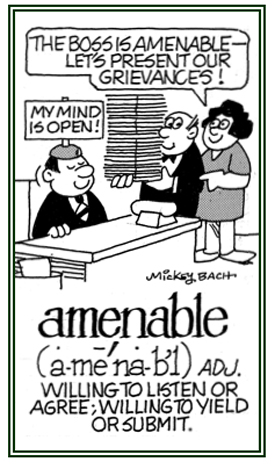
Go to this Word A Day Revisited Index
for a list of additional Mickey Bach illustrations.
2. Wildly; without self-control: Bradley went amok berserk one day when he went around shooting at everyone.
Click on this berserk link if you want more information about it.
3. Pertaining to a confused or disorganized condition; especially, when armed and dangerous: The sheriff was looking for an escaped prisoner who was running amok in the forest.In her unclear and mixed state of mind, Marita left her home and wandered amok on the prairie for hours.
4. A description of a jumbled or disorganized situation: No matter how many experts Jack and Jill had consulted, all of their travel plans went amuck!5. Etymology: from Malay amok, "attacking furiously". Earlier the word was used as a noun or adjective meaning "a frenzied Malay"; originally from a Portuguese form amouco or amuco.
Today anyone who wantonly shoots people is said to have run amuck (run amuck is the usual phrase to use); and so it indicates mental derangement, a madness to do violence or to kill indiscriminately.
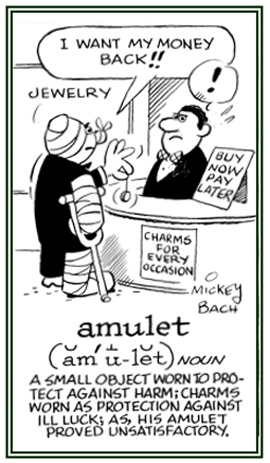
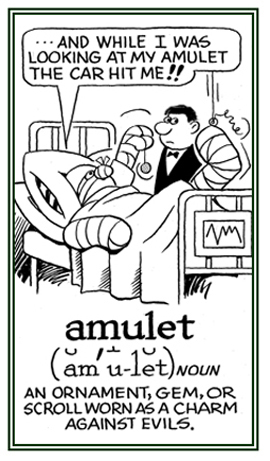
Go to this Word A Day Revisited Index
so you can see more of Mickey Bach's cartoons.
2. Etymology: formed by ant + ivity [-ity "condition or quality of being"].
2. Etymology: from Greek apolaustikos and related to the verb apolauein, "to enjoy".
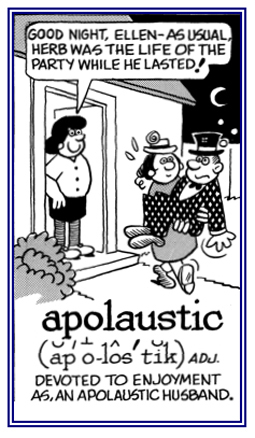
Go to this Word A Day Revisited Index
so you can see more of Mickey Bach's cartoons.
2. Etymology: from Greek apopemptikos, "sending away"; from the prefix apo-, "away" + pempein, "to send".
Now the practical automatic apopemptic message is, "Have a nice day!"
Someone might respond with: "I will, if I can find one."
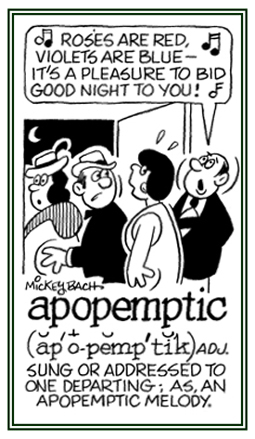
Go to this Word A Day Revisited Index
so you can see more of Mickey Bach's cartoons.
An app is not the same as computer software; such as, the operating systems, server processes, libraries which exist to support application programs, and utility programs.
2. A reference to something that is secret or mysterious: Helena was known for acquiring arcane messages from extrasensory sources which helped her clients solve some extraordinary problems.
Richard's psychology professor presented some theories that were filled with arcane details about how some people become psychopaths or have mental illnesses that make them behave in violent ways with other human beings.
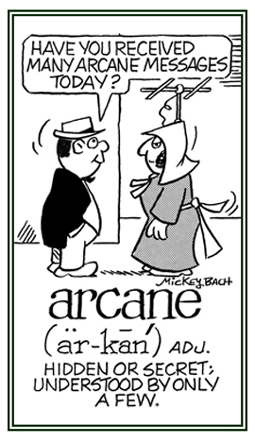
Go to this Word A Day Revisited Index
so you can see more of Mickey Bach's cartoons.
2. Etymology: from Greek archetypon, from arch, "chief" and typos, "stamp, pattern".
The "ch" in archtype is pronounced as k. So, according to The American Heritage Dictionary, the preferred pronunciation is AR ki tighp". The same k sound is found in "archaic", "archangel", and "archipelago".
2. Severely testing the endurance of some activity: Wars are always too long and arduous for both soldiers and civilian populations in warring countries.
It has become a very arduous task for people to endure the tornadoes that have been going through some areas of the country.
3. Etymology: "hard to accomplish, difficult to do", from Latin arduus, "high, steep".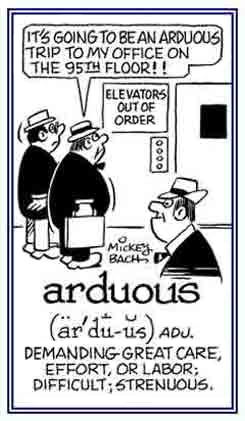
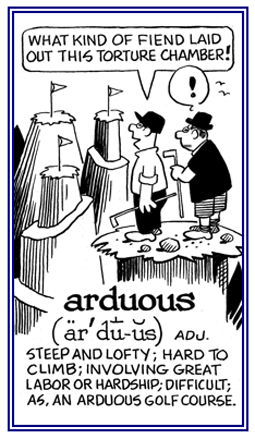
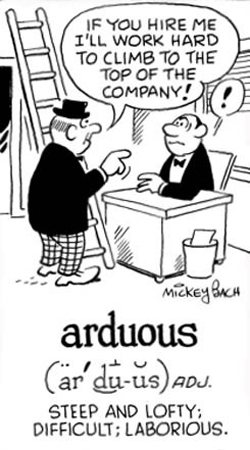
Go to this Word A Day Revisited Index
for a list of additional Mickey Bach illustrations.
2. The language of a particular group which is associated with similar activities; for example, the language of street gangs or criminals: Before the fight started, the mobs were yelling out their peculiar argots, or special slang terms, to communicate with their fellow mob members as a kind of code.
The teenagers were confusing their teachers by using special argots in their written reports.
The British have their argots and Americans usually have completely different argots which often result in a lack of understanding of the argots of the two cultures.
Sometimes it can be very difficult to understand the various argots of scientists, lawyers, and even medical professionals.
3. Etymology: about 1860, from French argot, "the jargon of Paris rogues and thieves"; earlier "the company of beggars"; from Middle French (the French language as written and spoken about 1400 to 1600), "a group of beggars", otherwise, the origin of the term is unknown.
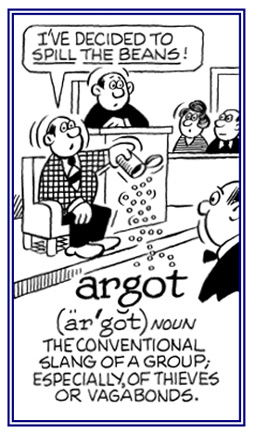
Go to this Word A Day Revisited Index
so you can see more of Mickey Bach's cartoons.
Links to all of the groups of English words in action, Groups A to Z.
You may see the bibliographic list of sources of information for these words in action.


